preview ex for Unit 11
科技英语翻译unit11
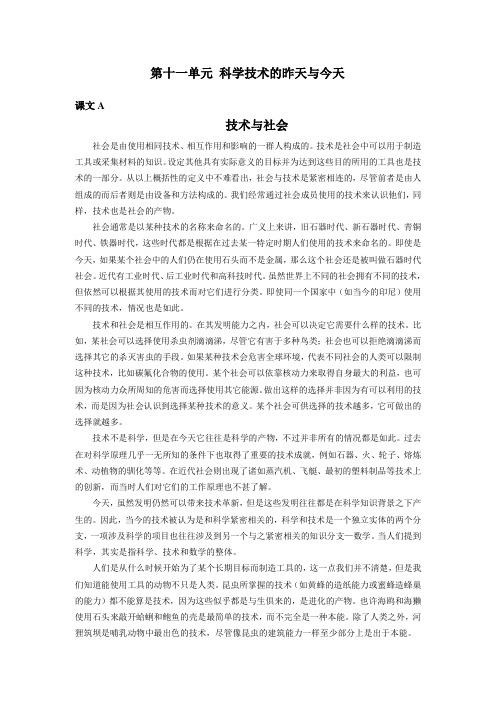
第十一单元科学技术的昨天与今天课文A技术与社会社会是由使用相同技术、相互作用和影响的一群人构成的。
技术是社会中可以用于制造工具或采集材料的知识。
设定其他具有实际意义的目标并为达到这些目的所用的工具也是技术的一部分。
从以上概括性的定义中不难看出,社会与技术是紧密相连的,尽管前者是由人组成的而后者则是由设备和方法构成的。
我们经常通过社会成员使用的技术来认识他们,同样,技术也是社会的产物。
社会通常是以某种技术的名称来命名的。
广义上来讲,旧石器时代、新石器时代、青铜时代、铁器时代,这些时代都是根据在过去某一特定时期人们使用的技术来命名的。
即使是今天,如果某个社会中的人们仍在使用石头而不是金属,那么这个社会还是被叫做石器时代社会。
近代有工业时代、后工业时代和高科技时代。
虽然世界上不同的社会拥有不同的技术,但依然可以根据其使用的技术而对它们进行分类。
即使同一个国家中(如当今的印尼)使用不同的技术,情况也是如此。
技术和社会是相互作用的。
在其发明能力之内,社会可以决定它需要什么样的技术。
比如,某社会可以选择使用杀虫剂滴滴涕,尽管它有害于多种鸟类;社会也可以拒绝滴滴涕而选择其它的杀灭害虫的手段。
如果某种技术会危害全球环境,代表不同社会的人类可以限制这种技术,比如碳氟化合物的使用。
某个社会可以依靠核动力来取得自身最大的利益,也可因为核动力众所周知的危害而选择使用其它能源。
做出这样的选择并非因为有可以利用的技术,而是因为社会认识到选择某种技术的意义。
某个社会可供选择的技术越多,它可做出的选择就越多。
技术不是科学,但是在今天它往往是科学的产物,不过并非所有的情况都是如此。
过去在对科学原理几乎一无所知的条件下也取得了重要的技术成就,例如石器、火、轮子、熔炼术、动植物的驯化等等。
在近代社会则出现了诸如蒸汽机、飞艇、最初的塑料制品等技术上的创新,而当时人们对它们的工作原理也不甚了解。
今天,虽然发明仍然可以带来技术革新,但是这些发明往往都是在科学知识背景之下产生的。
六年级英语下册Unit11Controllingfire课件1共18张PPT

Group discussion
What may cause a fire?
What must/mustn’t we do in a school fire ?
• Some students may not queue up in the corridor. We must queue up in the corridor.
Assignment
Ask different pairs to choose from the following topics for their poster 1)Fire---- our friend 2)Be careful of fires
• Some students may shout loudly and cry.
We must not shoutly or cry.
• Some students may stand outside the classroom and watch the fire
burning. We must not stand outside the classroom and watch the fire
What about you?
make glass get injured melt metals lose lives burn rubbish lose home
S1:I think fire is ...because...
run down the stairs
S2:What must/mustn’t we do
• Some students may remember to turn off the fans in their classroom.
《Unit-11-A-good-idea》牛津英语小学三年级(下册)精品课件

Do you like……? Yes, I do.
I like…… 我喜欢…… I like jogging.
I like running. I like skating.
I like jogging. I like swimming.
What do you like?
I like fishing. I like rowing. I like skiing. I like climbing.
football
basketball
volleyball
baseball
ping pong
…
(用like或play都可以)
(1) Do you play (like) _______? Do you play (like) ____?Yes, I do. Yes, I do.
Do you play (like) _______? Do you play (like) ____? No, I don’t. No, I don’t.
Let’s go fishing (钓鱼)
.
climb(爬山).
climbing
I like climbing.
Let’s go climbing (爬山)
.
swimming
climbing
running
jogging fishing
?
?
Do you like …? What do you like?
(2) I play(like)__________. I play (like)_____. What do you play (like)? What do you play (like)? I play (like)______. I play (like)_____. What do you play (like)? What do you play (like)?
第二版新世纪大学英语综合教程3课后习题答案
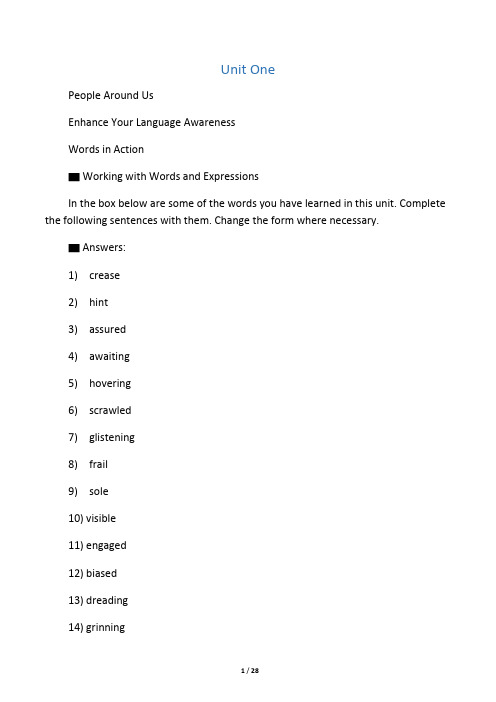
Unit OnePeople Around UsEnhance Your Language AwarenessWords in Action▆ Working with Words and ExpressionsIn the box below are some of the words you have learned in this unit. Complete the following sentences with them. Change the form where necessary.▆ Answers:1) crease2) hint3) assured4) awaiting5) hovering6) scrawled7) glistening8) frail9) sole10) visible11) engaged12) biased13) dreading14) grinningIn the boxes below are some of the expressions you have learned in this unit. Do you know how to use them in the proper context? Now check for yourself by doing the blank-filling exercise. Change the form where necessary.▆ Answers:1) for fear of2) pulled up3) except for4) get by5) make a living6) every so often7) in the background8) Shut off9) each and every10) as it is11) wraps … around her little finger12) caught us …unawares▆ Increasing Your Word PowerChoose the definition from Column B that best matches each phrasal verb in Column A, paying attention to the V+ Prep./Ad. collocation.▆ Answers:1) f2) c3) d4) e5) b6) g7) h8) aFill in each blank in the following sentences with a proper phrasal verb. Change the verb form where necessary.▆ Answers:1) let out2) clean … up4) waiting on5) picked up6) ended up7) headed for8) ran through▆Answers:1) foretell2) preview3)4) postscript5) postgraduate6) precondition7) ex-husbandGrammar in ContextTask 1: Combine the given sentences into one by using attributive clauses.▇ Answers for reference:I encountered many people whose lives amazed me. (See Para. 3, Text B)We drove in silence to the address (that/which) she had given me. (See Para. 21, Text B)He pushed through the doors and headed for the back room where his apron and busing cart were waiting. (See Para. 16, Text A)I had seen too many people trapped in a life of poverty who depended on the cab as their only means of transportation. (See Para. 6, Text B)Their social worker, who stopped to check on Stevie every so often, admitted Stevie and his mother had fallen between the cracks. (See Para. 6, Text A)Task 2: Complete the following sentences by translating the Chinese in the brackets into English. Be sure to use present particles or past particles to modify nouns.▇ Answers for reference:well-considered decision, folded paper, written notice, laptop storing my annual report, a postman delivering express mailCloze▆ Complete the following passage with words chosen from Text A. The initial letter of each is given.▆ Answers:reliablesyndromeadoptedgot done withgloomyor somethingchancebarelyin good shapeboothmessscrawledpeekinginTranslation1. Translate the following sentences into English, using the words and expressions given in brackets.▆ Answers for reference:What I didn’t count on was that over time I would sincerely take pride in being a social worker.Shooting a quick look at the clock on the wall, Grandma let out a cry, “Oh, My dear /My goodness/My gracious, we’re going to miss the train!”At the kindergarten entrance, I always see some kids/children holding firmly on to their parents. Should young parents be sterner towards their kids/children and leave immediately under these circumstances?In the dim street light stood a weeping little girl/ a girl weeping.When making donations, rich people should be as considerate as possible in order not to put the recipient in an embarrassing situation.2. Translate the following paragraph into English using the words and expressions in the box below.▆ Answer for reference:Theme-Related Writing▆ Do one of the following writing tasks after class.Suppose you were Frannie, the head waitress, in Text A. Write a short story about Stevie from your perspective.Read the following newspaper clipping and write a short essay on the question:Should We Offer Seats to Elderly People on the Bus during Rush Hours?▆Sample Essay for Task 1:We all knew Stevie was mentally handicapped, so everyone, especially our boss himself, doubted whether he would be a capable busboy in the truck-stop restaurant where I worked as the head waitress. However, our worries were gradually removed one week later. Smiling and hard-working, Stevie won over all our trucker regulars as well as us employees.Later we learnt that Stevie badly needed the job because the money he earned made it possible for his mother and him to live together; otherwise he would be sent to a group home. So you can imagine how worried Stevie was when he had to take sick leave for heart surgery. He was afraid that he would lose his job. After the operation, in the week before he returned, he called 10 times to make sure that hecould still have the job back. At that time, what concerned me most was how Stevie could handle the huge medical bills.Now, Stevie is still working here. Our boss thinks that Stevie is the best worker he has ever hired. (240 words)▆Sample Essay for Task 2:Should We Offer Seats to Elderly People on the Bus During Rush Hours?I am amazed to read what a blogger says about offering bus seats to the elderly. He claims that “it’s the young who need it more” because they go to work early in the morning and feel exhausted after a day’s work. The blogger also argues that it is unfair to offer seats to the elderly since they already enjoy free rides, and further suggests that during rush hours senior citizens be denied such treatment.Respecting the elderly is also our social convention. It is precisely out of our love and respect for the elderly that such special benefits as free rides are offered to them. No one can deprive senior citizens of their right to go out by bus at any time they like, and what’s more, we should make sure that they get special care when the bus is fully packed with passengers.Caring for the elderly and being taken care of can be a mutually satisfying experience for everyone involved. It is through performing such small acts as offering seats to the needy that we learn to contribute to the building of a harmonious society.(268 words)Unit TwoLoveEnhance Your Language AwarenessWords in Action▆ Working with Words and ExpressionsIn the box below are some of the words you have learned in this unit. Complete the following sentences with them. Change the form where necessary.▆ Answers:curledminimumclipyieldedGivenpreservefascinatedaffectioninteracthastegriefdefiespresenceacquiremanipulaterestraintsIn the box below are some of the expressions you have learned in this unit. Do you understand their meanings? Do you know how to use them in the proper context? Now check for yourself by doing the blank-filling exercise. Change the form where necessary.▆ Answers:let, loose onfit intohold onstate of affairsin the course ofin vainbuild, onIn shortreached forgive and take▆ Increasing Your Word PowerThe prefix over- can be added to nouns, verbs, adjectives and adverbs, meaning “above”, “outside”, “across”, or “too much”. Study the words given in the box and choose the proper word to fill in each of the blanks in the following sentences. Change the form where necessary.▆ Answers:overcoatoverheadoverjoyedoversleptoverweightoverdueovertimeoverworking▆ Answers:crushattributesfancybubbledgraspdrizzlinglabelingyieldListed in the box below are some idiomatic expressions formed with the word “hand”. Study them carefully and try to make out their meanings. You may consult a dictionary if necessary. Then translate the given sentences into English, using one of them.▆ Answers:We are short of hands.I still have some money in hand.Give me a hand with this box, please.I often keep a dictionary at hand.The football fans were out of hand.Hand out the pencils to everyone in the class.This ring was handed down to me by my grandmother.Time’s up. Please hand in your test papers.Please hand on the magazine to your roommates.I’m afraid I can’t help you. I’m a green hand.Grammar in Context▆ Answers for reference:Sitting on the stairs was / On the stairs was sittingOver the wall came / flewRound the corner wasThen finally cameUnder the table was lyingAt / On the top of (On top of) the hill stoodNow correct the mistakes in the following sentences, if any. Write NONE under the correct sentence(s).▆ Answers for reference:The beaver chews down trees to get food and material to build its home with.Do your parents think Tom is a nice boy to go out with? (Cross out him)The goals for which he has fought all his life seem unimportant to him now.NONE.The essay starts by asking a question, to which the author then gives a positive answer.ClozeComplete the following passage with words chosen from this unit. The initial letter of each is given.▆ Answers:hastestate of affairsdistinguishedmeeting of mindsblossominner charmintimacyemotionacquiringidealsadmirationlastingaffectionforgehonoroverwhelmingTranslationTranslate the following sentences into English, using the words and expressions given in brackets.▆ Answers for reference:In either friendship or love / In both friendship and love, you should never expect to take / receive the maximum while you give the minimum.I built all my hopes on his promise(s), only to find that he was not a man of sincerity at all.We took Mother to all the best hospitals we could find, but all our efforts were in vain; she failed to survive the disease.Valentine’s Day is an annual holiday celebrated on February 14, a perfect day to express love to the object of your / one’s affection.Love needs to be nurtured, and the “eternal / everlasting love” that we all dream to have is not forged until we learn to appreciate and tolerate the other.Translate the following paragraph into English, using the words and expressions in the box below.▆ Answers for reference:Theme-Related WritingDo either one of the following two tasks after class.1. Based on Text A, write a passage about the different ways different generations handle male-female relationships. The following hints may be of some help.1) “our” parents’ generation (details mainl y found in Para. 8);2) “my” generation (details mainly found in Paras. 3–7);3) the younger generation (details mainly found in Paras. 9–11).2. Study the following data on love and marriage based on a survey with girl students. Write a passage on the to pic “What do girl students look for in love and life?”▆ Sample Essay One:Male-female relations are indispensable to adults all through their lives. But different generations handle them differently. Our parents’ generation lived in an era of constraints, restraints, respect, admiration, and plenty of romance. They kept a distance from people of the opposite gender in order to preserve the holiness of love and relationships.My generation, on the other hand, began with countless crushes for the opposite sex just because of their superficial charm. Harmless as they were, the love was as brief as soap bubbles. As we grew up, we came to the stage of developing real relationships, believing that love demanded a lot of give and not so much of take.In short, the younger generation focuses more on physical beauty, closeness and passion, and they tend to seek what they want from the relationships. The other two generations give priority to inner charm, intimacy, emotion and sharing in dealing with relationships. (196 words)▆ Sample Essay Two:What Do Girl Students Look for in Love and Life?In order to know about girl students’ opinion about love and life, a survey with girl students was conducted in 2005 in two universities — Chongqing University of Technology and Business and East China Normal University. The survey sought answers to two questions: What do you look for first in a boyfriend? What’s the most important thing for a happy life?As to their views about a happy life, nearly seventy percent of the girls attached the greatest importance to marriage and family. “Career” was given top priority by just under 20 percent, while even fewer, around 9 percent, believed that money was the key to a happy life.Based on the survey, we may conclude that nowadays, girl students generally hold a rational attitude towards love and life. Admittedly, the improved material conditions of life explain why girls take economic status and money rather lightly. But contrary to the popular view that girls are more concerned about self-development in the workplace and social status, they still regard marriage and family life as central to a happy life. (235 words)Unit ThreeFriendshipEnhance Your Language AwarenessWords in ActionWorking with Words and ExpressionsIn the box below are some of the words you have learned in this unit. Complete the following sentences with them. Change the form where necessary.▆ Answers:boundunfoldedpossessinghas surpassedappointedvirtueshad correspondedgazedkeengraspedgroundedsensibleregulatingIn the box below are some of the words you have learned in this unit. Do you know how to use them in the proper context? Now check for yourself by doing the blank-filling exercise. Change the form where necessary.▆ Answers:distinguish betweenchecked up ontorn downmake a fortuneall of a suddenlost track ofCasting an eye overbroke uptake pleasure indescribed asturned upin so far asis under arrestpass onas to▆ Increasing Your Word PowerThe preposition “as” is often used together wi th some verbs to describe the fact that sb./sth. has a particular function, role or job. Translate the following into Chinese, paying attention to the “verb… as”collocation.▆ Answers:him both as a father and as a writermyself as a swan dancing on the lakethe challenge as an opportunity to test his courageme as one of their family membersit as a jokeMark as being in his late teens, tall and friendly to everyoneas the greatest painter of his timelove as a way of life, it as a way to feelDid you no tice the suffix “-al” or “-ial” in the words “trial” and “arrival” in this unit? The suffix “–al” or “-ial” can be added to verbs to form nouns. Put down the noun forms of the following verbs in the space provided.▆ Answers:Now fill in the blanks in the following sentences by choosing the proper words with the suffix “–al” or “–ial” from the above table.refusalarrivalsremovaldismissalsurvivalproposaldisposalapprovalGrammar in ContextIn Unit 2 and Unit 3 you find the following sentences containing “no matter what”, “whenever” and “whatever.”▆ Answers for reference:whichever tent you are not using nowwhichever / whatever condition our captain thought was the bestWherever / No matter where I gowhatever wishes their child / children expresses/expressHowever disappointed / No matter how disappointed you may feel about the surroundings / environment / situationWhoever breaks itwhenever he concentrates on a problemThe structure “It is…that / who…” is used to achieve emphasis, as shown in the following sentences taken from Text A.Now correct the mistakes in the following sentences, if any. Write NONE under the correct sentence(s).▆ Answers for reference:It is not luck but hard work that led him to today’s success.Prof. Moen argues that it is energy that makes the world go round.It was not until he had proved he was honest that he won the family’s trust.It was clearly the headmaster himself who/that opened the door for me.NONEClozeComplete the following passage with words and phrases chosen from Text A. The initial letter of each target word is given.▆ Answers:classicalnotionutilitygroundoccursgoodnessas topossessesboundmirrorvirtuousmoral excellenceTranslation1. Translate the following sentences into English, using the words and expressions given in brackets.▆ Answers for reference:There spring up so many new things every day in the world that it is no longer sensible to expect a person to know / keep track of everything.Laws do not regulate such things as betrayal to friends; that is why there is what we call / is called “the court of morality”.Today’s culture is described as “fast-food culture”. Whatever they may be / are doing, people just pursue the greatest / maximum satisfaction within the shortest time.As the saying goes, there is no such thing as a free lunch. If you want something, go and earn / work for it.Translate the following paragraph into English using the words and expressions in the box below.▆ Answers for reference:Theme-Related WritingDo either of the following two tasks after class.Suppose you were Jimmy Wells in Text B. Write about your friendship with Bob from childhood to the moment when Bob was arrested. You may follow the chronological sequence of events or use flashback — a narrative technique that allows a writer to present past events during current events. Be sure to include both facts and opinions in your writing.Write about one of your close friends according to the outline given below.1) a brief introduction of the friend3) the influence of the friendship upon your life▆ Sample essay for task 1:Then came the day we were supposed to meet. I was on my beat then. Walking up to the appointed place which had been turned into a hardware store, I saw a man standing there with an unlighted cigar in his mouth. Before I could speak, he told me that he was waiting for a friend by the name of Jimmy Wells. When he struck a match to light his cigar, I saw a pale face with keen eyes and a scar. I recognized him immediately. It was Bob, and it was also the face of the man wanted by the Chicago Police. For a moment I felt like telling him to escape right away. After all, we had been friends for so many years and he had traveled all the way to see me! But then my sense of duty told me the right thing to do. I said good-bye to him and continued my patrol, his last words still ringing in my ear: “I’ll wait for half an hour. Jimmy will keep his promise if he’s alive…” I then sent for a plain clothes man and had Bob arrested.(270 words)▆ Sample essay for task 2:An Important Friend in My LifeLi Qiang, one of my classmates, is fun to be with. He is always wearing a broad smile as if life is forever “sunshine and butterflies.” One day, I revealed to him my worries and anxieties: I, an ordinary-looking girl, was 177 centimeters tall, even taller than any of the boys in my class. I thought no boy would like to date me. Besides, I was very poor at my academic courses.He suggested that I should learn to be myself and then he introduced me to a fashion show team of the university. Encouraged, I decided to change myself. After a 3-month training program on weekends, I could perform beautifully as a model, and surprisingly, I could concentrate on the required academic courses as well. The applauses I won at each fashion show and the scholarship I earned proved that being myself was terrific. Since then, my life has changed a lot. Thus, Li Qiang became an important friend of mine.Unit FourSportsEnhance Your Language AwarenessWords in Action▇ Working with Words and ExpressionsIn the boxes below are some of the words you have learned in this unit. Complete the following sentences with them. Change the form where necessary.▇ Answers:1) narrowly2) proceeded3) features4) crawl5) spun6) flashed7) qualify8) Despite9) congratulate10) consultant12) disciplined13) confessed14) tripped2. In the boxes below are some of the expressions you have learned in this unit. Do you know how to use them in the proper context? Now check for yourself by doing the blank-filling exercise. Change the form where necessary.▇ Answers:1) kind of2) are in for3) came in4) rose to their feet5) brought up6) made … a fool of herself7)8) get hot under the collar9) looked the part10) in an emergency11) has had her eye on12) is … taking shape13) bring out14) put in/ squeeze in15) win … hands down▇ Increasing Your Word PowerChoose two verbs from Column B for each noun in Column A, paying attention to the v.+ n. collocation. Write down the verbs in the space provided before the corresponding noun. The first item has been done for you.▆ Answers:Now fill in each blank in the following sentences with a verb in Column B. Change the verb form where necessary.▆ Answers:applaudembodies/representsforged/formedcongratulatedbrokenawardedcrossed/reachedhost2. The suffix “–cy” can be added to some adjectives, nouns or verbs to form nouns, meaning “the state or quality of…”, or “the status or position of…”. Now form new words after the example and give their meanings in Chinese. Consult a dictionary if necessary.▇ Answers:Now fill in the blanks in the following sentences by choosing the proper words you have just formed.▇Answers:1) secrecy2) presidency3) consistency4) efficiency5) privacy6) intimacy7) accuracy8) self-sufficiency9) adequacy10) delicacyGrammar in ContextStudy the following sentences, each of which contains either an “appositive phrase” or an “appositive clause”, and then do the following task.Now translate the following sentences in to English, using either an “appositive phrase” or an “appositive clause” .▇ Answers for reference:1) Football, his only hobby in life, has brought him many friends.3) The question whether to confess or not has been troubling little Tom.4) You should not have any doubt about the fact that the criminal has been arrested.5) The news was immediately spread far and wide that Beijing had won the bid for the 2008 Olympic Games.2. Study the following sentences from this unit, paying special attention to the constructions “not… but…” and “not only/simply…but (also)…”, and then do the following task.Now answer the questions with the help of the hints given in brackets, using the constructions “not… but…” and “not only/simply…but (also)…”.▇ Answers for reference:2) It is not the players, but the supporters that are responsible for football hooliganism.3) No, their intent is not to catch all speeders but to catch enough to give them a warning.4) I’m not only willing, but (also) eager to join the volunt eer team for the World Cup.5) No. He translates into English not only from French, but (also) from Polish.6) Because its appeal lies not only in its story but also in the ethical issues it raises.Cloze▆ Complete the following passage with words chosen from Text A. The initial letter of each is given.▇ Answers:(1) disciplined(2) having … eye … on(3) hands down(4) in for(5) hitting(6) under wraps(7) add…support to(8) hot under the collar(9) fouling(10) tremendously(11) reassured(12) qualify(13) formed/forged(14) breakingTranslationTranslate the following sentences into English, using the words and expressions given in brackets.▇ Answers for reference:The gasoline price is now at an all-time high, which has brought about wide public concern.He found that fish and rice feature the Japanese diet, and he then proceeded to write a report on Japanese cooking culture.He was a beggar but he didn’t look the part at all, because he was clean-shaven, wearing glasses and a brand-new suit.Having tripped over another athlete’s foot, he fell down on the track, but soon rose to his feet and limped to the finish line.2. Translate the following paragraph into English, using the words and expressions in the box below.▇ Answers for reference:Theme-Related Writing1. Write an essay about your favorite sports team. The following hints may be of some help.1) What is your favorite sports team?2) Why do you like it so much?3) Do you always support the team?▇ Sample essay 1:My favorite Sport Team: the C hinese Women’s Volleyball TeamIn quite a few sports, Chinese women athletes outshine men athletes. As a girl, I always feel proud of our women table tennis players, badminton players, women divers and gymnasts. But my greatest enthusiasm always goes to the Chinese Women’s Volleyball Team, who, though it has undergone some ups and downs, always presents a positive, inspiring image to the public.I’ve never missed any major TV coverage of the Chinese women’s team. I can’t help getting excited watching the girls shine in court, with their amazing spikes and blocks, and their never-ceasing courage and faith in winning the match. There are times when they lose the game, sometimes with embarrassing result like 0:3; there are years when they suffer a lot of injuries and new players do not match up to the veterans, yet, one must admit that the Chinese girls have been practising very hard all the way.(196 words)2. Write an essay entitled “The Meaning of Winning a Prize”. You may base your writing on what you have learnt from the two texts. The following hints may be of some help.1) What is a prize?2) What does a prize bring about?3) What is the fundamental meaning of wining prizes?▇ Sample essay 2:(249 words)。
大学英语综合教程四Unit11答案
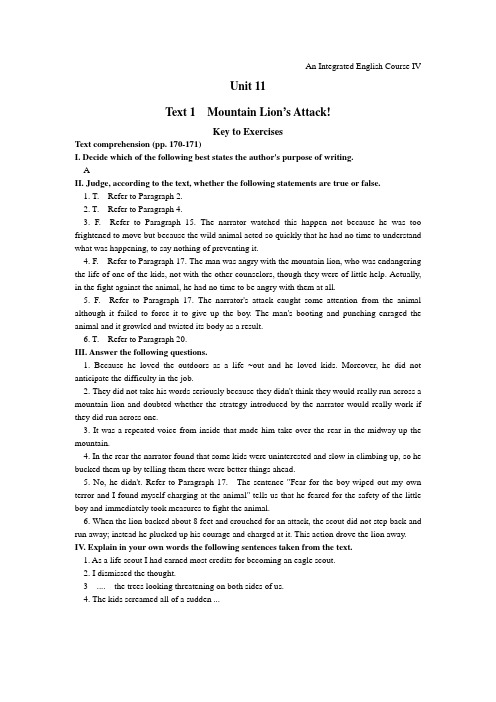
An Integrated English Course IVUnit 11Text 1 Mountain Lion’s Attack!Key to ExercisesText comprehension (pp. 170-171)I. Decide which of the following best states the author's purpose of writing.AII. Judge, according to the text, whether the following statements are true or false.1. T. Refer to Paragraph2.2. T. Refer to Paragraph 4.3. F. Refer to Paragraph 15. The narrator watched this happen not because he was too frightened to move but because the wild animal acted so quickly that he had no time to understand what was happening, to say nothing of preventing it.4. F. Refer to Paragraph 17. The man was angry with the mountain lion, who was endangering the life of one of the kids, not with the other counselors, though they were of little help. Actually, in the fight against the animal, he had no time to be angry with them at all.5. F. Refer to Paragraph 17. The narrator's attack caught some attention from the animal although it failed to force it to give up the boy. The man's booting and punching enraged the animal and it growled and twisted its body as a result.6. T. Refer to Paragraph 20.III. Answer the following questions.1. Because he loved the outdoors as a life ~out and he loved kids. Moreover, he did not anticipate the difficulty in the job.2. They did not take his words seriously because they didn't think they would really run across a mountain lion and doubted whether the strategy introduced by the narrator would really work if they did run across one.3. It was a repeated voice from inside that made him take over the rear in the midway up the mountain.4. In the rear the narrator found that some kids were uninterested and slow in climbing up, so he bucked them up by telling them there were better things ahead.5. No, he didn't. Refer to Paragraph 17. The sentence "Fear for the boy wiped out my own terror and I found myself charging at the animal" tells us that he feared for the safety of the little boy and immediately took measures to fight the animal.6. When the lion backed about 8 feet and crouched for an attack, the scout did not step back and run away; instead he plucked up his courage and charged at it. This action drove the lion away. IV. Explain in your own words the following sentences taken from the text.1. As a life scout I had earned most credits for becoming an eagle scout.2. I dismissed the thought.3 .... the trees looking threatening on both sides of us.4. The kids screamed all of a sudden ...Structural analysis of the text (p171)The text can be divided into the following three parts:Part I: Paragraph 1; Part Il: Paragraphs 2-20; and Part m: Paragraph 21.The topical sentences are:Part I: It was my idea of the perfect summer job: working as a camp counselor in the Rocky Mountains.Part II: I realized working with the kids could also be a real pain.Part III: It means being prepared to really listen when somebody's giving me divine directions.Rhetorical features of the text (p172)To describe what he did in his attempt to fight the mountain lion, the author of the text uses two kinds of verbs, i.e. verbs expressing verbal actions and those indicating material actions.For the first kind, we can find: screaming(Paragraph 16); yelling at the top of my lungs (Paragraph 17); roared, yelling (Paragraph 18). And for the second kind, we can find: spun around to the others (Paragraph 16); ran towards the lion, charging at the animal, kicking its muscular side as hard as I could, kicked again and again, even punched it with all my might (Paragraph 17); and slammed my foot into the cougar's whiskered face, pulled back to boot it again, charged at it (Paragraph 18). The use of these verbs shows effectively that the author did everything he could in his fight against the fierce animal and his attempt to protect the child.Vocabulary exercises (pp172-173)I. Explain the underlined parts in the sentences below.1. becoming a senior scout2. reckoned3. annoying4. becoming unnaturally large5. turned round6. gave honour to me/praised meII. Choose a word that best completes each of the following sentences.1. B2. D3. B4. C5. C6. AIII. Fill in the blank in each sentence with a phrase taken from the box in its appropriate form.1. buck up2. at the top of their lungs3. was ... wiped out4. in a fit of rage5. charged at6. shrug off7. spun around 8. took overIV. Explain the meaning of the underlined word or phrase in each sentence.1. testee2. serves3. actually4. again5. applauded/clapped excitedly6. causeGrammar exercises (pp173-175)I. Insert to, if necessary, in the following sentences.1. to2. /3. /4. to5. /6. /7. to8. to, toII. Combine the two sentences in each pair into one, using one nonfinite clause.1. I found myself charging at the animal, kicking its muscular side as hard as I could.2. He wailed, tears pouring down his cheeks.3. I was relieved to find out that I had passed the exam.4. John Alcock was the first man to succeed in flying non-stop across the Atlantic.5. I heard someone knocking.6. Left to the care of his grandmother, Ted grew to be a well-behaved boy.III. Correct the errors in the following sentences.1. While I was waiting for a bus, a brick fell on my head.2. Since I believed that I was the only person who knew about this beach, the sight of someone else on it annoyed me very much.3. When I read in bed, my hands often get very cold.4. Climbing down the tree, he broke his leg.5. We saw the first star shining in the sky.6. When planting these trees, one must take care not to damage the roots.IV. Explain the italicized parts in the following sentences.1. who were sleeping2. that are not declared3. that should be made4. When she realized5. If/When it is heated6. in order to haveV. Make sentences of your own after the sentences given below, keeping the underlined structures in your sentences.1. Flying a plane is dangerous.2. Success means working very, very hard.3. The old man was fast asleep, holding a book in his hand.4. A small boy ran past, his satchel trailing behind him.Translation exercises (p175)I. Translate the following sentences into English, using the words or phrases given in the brackets.1. John's friends said he was mistaken, but he stood his ground.2. The wounded elephant charged at the tree with terrific violence.3. He shrugged off our questions; he would not tell us what had happened.4. The detective discovered among them his long-sought prey.5. A good holiday will buck you up.6. He saluted, spun round and bounced out.7. He took out a gun and shot his opponent in a fit of rage.8. He jumped at any chance of getting a promotion.II. Translate the following passage into Chinese.机会不常来,只是偶尔有之。
新目标大学英语综合教程1课后习题答案

Unit 1 College LifeText ALanguage in Use4.1) overlooking 2) overwhelming 3) enroll 4) keen 5) blend6) inspiration 7) frequented 8) diversity 9) passion10) incredible5.1) The Sept. 4 game between the Seahawks and the Packers kicked off this year’s football season.2) A big part of a woman’s diet should consist of fruits and vegetables, whole grains, high-fiber foods, and oily fish.3) Eleanor Roosevelt, who was a shy young girl, was terrified at the thought of speaking in public.4) Senior citizens, military veterans and businessmen make up the group of people requesting for government information in the United States.5) The schedule will make you aware of how you spend your time.6.reach a decision (达成决定) shape one’s life (塑造生活)analyze a problem (分析问题) approvea decision (通过决定)improve one’s life (改善生活) solve a problem (解决问题)1) making 2) reach 3) changed 4) shape5) enjoy 6) solve 7) analyze 8) encounter7.1) dishonest 2) illegal 3) substandard 4) irregular 5) unlock 6) incorrect 7) outnumber 8) supermarket 9) Undergraduate 10) overestimate8.1) 学习小组合作学习对应对哈佛繁重的学习任务起着重要的作用。
EIM Book 1 Unit 11 Promise。promise 单元知识要点
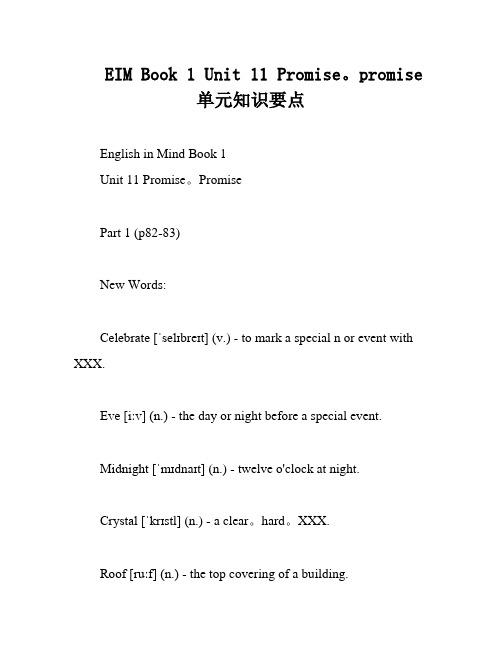
EIM Book 1 Unit 11 Promise。
promise单元知识要点English in Mind Book 1Unit 11 Promise。
PromisePart 1 (p82-83)New Words:Celebrate [ˈselɪbreɪt] (v.) - to mark a special n or event with XXX.Eve [iːv] (n.) - the day or night before a special event.Midnight [ˈmɪdnaɪt] (n.) - twelve o'clock at night.Crystal [ˈkrɪstl] (n.) - a clear。
hard。
XXX.Roof [ruːf] (n.) - the top covering of a building.Ground [graʊnd] (n.) - the surface of the earth.Break [breɪk] (v.) - to separate into pieces.Strike [straɪk] (v.) - to hit or attack.Familiar [fəˈmɪliə(r)] (adj.) - well-known or easily recognized.Drop [drɒp] (v.) - to fall or let something fall.Gym [dʒɪm] (n.) - a place for physical XXX.Angrily [ˈæŋgrɪli] (adv.) - in a way that shows anger or annoyance.XXX:Times Square - a major commercial n。
tourist n。
XXX center in New York City.Increase [ɪnˈkriːs。
渭南市初中英语七年级下册Unit 11知识点(含答案解析)

一、选择题1.you see______ horses on the farm 1ast week?A.Do;some B.Do;anyC.Did;some D.Did;any D解析:D【解析】句意:上星期你在农场看到马了吗?根据时间状语1ast week判断,时态为一般过去时态,排除A,B;some用于肯定句,any用于否定句和一般疑问句,故答案为D。
2.—Did Molly go to the library yesterday?—_______.A.Yes, she was B.Yes, she is C.Yes, she does D.Yes, she did D解析:D【解析】句意:——莫莉昨天去图书馆了吗?——是的,她去了。
根据问句是did引导的一般过去时的一般疑问句,因此答语也应该用did回答,结合选项,只有D选项符合题意,故答案选D。
3.—Did Mike go to the sports center yesterday?—_______. He went to the library.A.Yes, he was B.No, he wasn’tC.Yes, he did D.No, he didn’t D解析:D【解析】句意:昨天迈克去体育中心了吗?—不,他没有,他去图书馆了。
本题考查一般疑问句的用法。
问句中Did提问,答句中使用did回答,排除选项A、B。
从答句可知他去图书馆了,说明是否定回答,故选D。
4.me carefully, boys and girls. Can you______ me clearly?A.Listen to; hear from B.Hear; listen toC.Hear; hear D.Listen to; hear D解析:D【解析】【详解】句意:仔细听我说,男孩们和女孩们。
你们能听清楚吗?listen to意为“听”, 强调听的动作。
Unit11SectionA 3a-3c课堂笔记-人教英语九年级全册
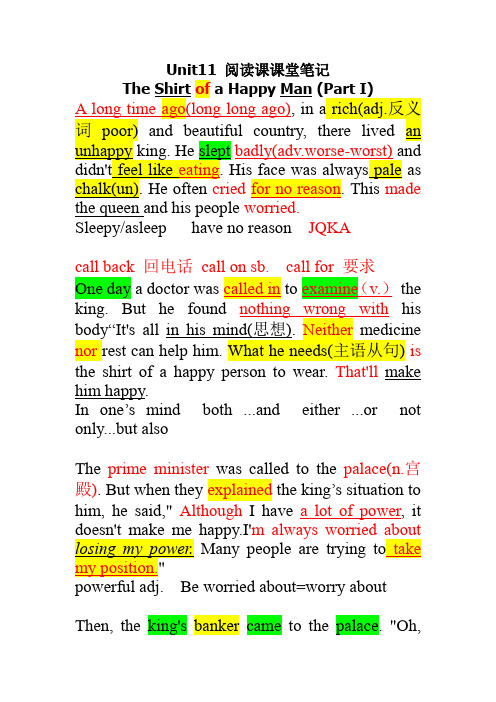
The Shirt of a Happy Man (Part I)A long time ago(long long ago), in a rich(adj.反义词poor) and beautiful country, there lived an unhappy king. He slept badly(adv.worse-worst) and didn't feel like eating. His face was always pale as chalk(un). He often cried for no reason. This made the queen and his peopleSleepy/asleep have no reason JQKAcall back 回电话One day a doctor was called in to examine(v.)the king. But he found nothing wrong with his body“It's all in his mind(思想). Neither medicine nor rest can help him. What he needs(主语从句) is the shirt of make him happy.In one’s mind both ...and either ...or not only...but alsoThe prime minister was called to the palace(n.宫殿). But when they explained the king’s situation to him, he said," Although I have a lot of power, it doesn't make me happy.I'm always worried about losing my power.Many people are trying to take my position."Then, the king's banker came to the palace. "Oh,I'm afraid that I'm not happy either, he said"I have a lot of wealth, but I'm always worried about losing my money. Someone tries to steal my money every day.wealthy adj. grassy sandyNext, the palace singer came to the king's room. But this was what he said: "It's true that(确实是)I'm famous and everyone loves my songs. But I'm not happy because I'm always worried about being followed by others. I cannot be free!"follow sb. followingfree-freedom n. free of charge free sb. Finally, the king's top general was told to go out and find a happy man in three days' time. three weeks’ holiday(To be continued) kingdom 王国UKThe general searched and searched but couldn't find anyone. It seemed that everyone had their own problems, and no one was truly(*true) happy. Two days passed. Just as he was about to(将要) give up, he saw a poor man on the street. He was eating with his hands and singing happily to himself. The general went up to(直接走向)him.General: Hello! I'm the king's top general.Man:Hi, General. What can I do for you today? General: I heard you singing just now, and you sound very happy.Man: That's because I am happy. misunderstand General: But I don't understand. What makes you so happy? You have no power, money or fame. No=not aMan:I have everything (that) I want, and I don't want what I can't have. So I'm happy, and my song comes from(is from)the happiness in my heart. General: Then I need to give your shirt to the king. Is it there in your bag? How much do you want for it?Man:Shirt? What shirt? I don't own(v.拥有have) any shirt.。
英语常用词根词缀
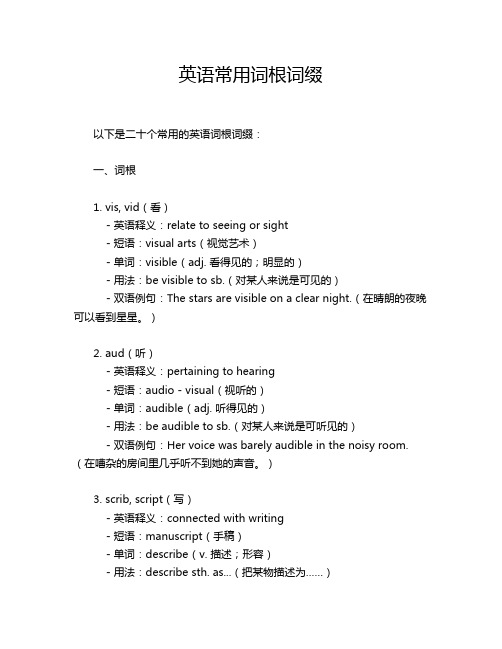
英语常用词根词缀以下是二十个常用的英语词根词缀:一、词根1. vis, vid(看)- 英语释义:relate to seeing or sight- 短语:visual arts(视觉艺术)- 单词:visible(adj. 看得见的;明显的)- 用法:be visible to sb.(对某人来说是可见的)- 双语例句:The stars are visible on a clear night.(在晴朗的夜晚可以看到星星。
)2. aud(听)- 英语释义:pertaining to hearing- 短语:audio - visual(视听的)- 单词:audible(adj. 听得见的)- 用法:be audible to sb.(对某人来说是可听见的)- 双语例句:Her voice was barely audible in the noisy room.(在嘈杂的房间里几乎听不到她的声音。
)3. scrib, script(写)- 英语释义:connected with writing- 短语:manuscript(手稿)- 单词:describe(v. 描述;形容)- 用法:describe sth. as...(把某物描述为……)- 双语例句:She described the man as tall and handsome.(她把那个男人描述为又高又帅。
)4. dict(说)- 英语释义:relate to saying or speaking- 短语:dictation(听写)- 单词:dictate(v. 口述;命令)- 用法:dictate sth. to sb.(向某人口述某事)- 双语例句:The boss dictated a letter to his secretary.(老板向他的秘书口授一封信。
)5. port(拿,带)- 英语释义:carry or bear- 短语:import(进口;输入)- 单词:portable(adj. 便携式的;手提的)- 用法:a portable device(一个便携式设备)- 双语例句:This portableputer is very convenient for business trips.(这台便携式电脑对于商务旅行非常方便。
人教版九年级英语全册Unit11单元整体教学设计
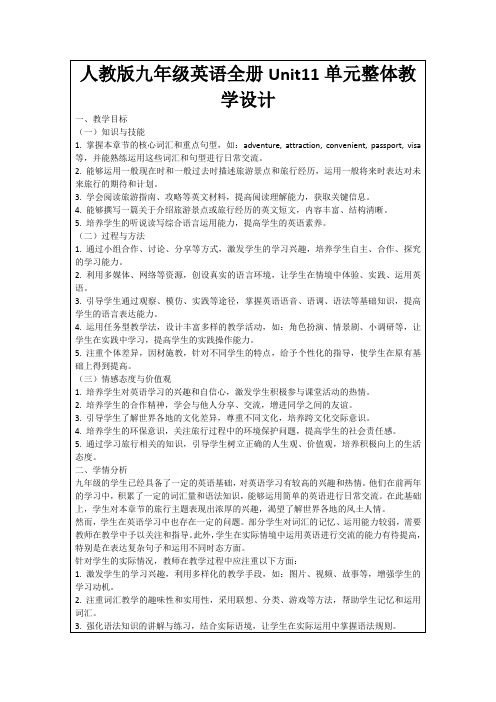
3.强化语法知识的讲解与练习,结合实际语境,让学生在实际运用中掌握语法规则。
4.针对学生个体差异,实施分层教学,关注每个学生的学习需求,提高他们的自信心和学习积极性。
5.创设丰富的语言环境,鼓励学生大胆开口,提高学生的听说能力和口语表达能力。
人教版九年级英语全册Unit11单元整体教学设计
一、教学目标
(一)知识与技能
1.掌握本章节的核心词汇和重点句型,如:adventure, attraction, convenient, passport, visa等,并能熟练运用这些词汇和句型进行日常交流。
2.能够运用一般现在时和一般过去时描述旅游景点和旅行经历,运用一般将来时表达对未来旅行的期待和计划。
四、教学内容与过程
(一)导入新课(500字)
1.教师通过展示一组世界各地旅游景点的图片,引导学生观察并询问:“Where have you been? Where would you like to go?”,让学生分享自己的旅行经历和梦想。
2.学生分享后,教师引入本节课的主题:“Today, we are going to learn about travels and adventures. We will talk about some famous attractions and our travel experiences.”
五、作业布置
为了巩固本节课所学知识,培养学生的自主学习能力和实际运用能力,特布置以下作业:
1.完成课后练习册的相关练习,巩固词汇和语法知识。
-选择题:检测学生对词汇和时态知识的掌握程度。
-填空题:培养学生运用所学词汇和句型进行填空的能力。
Unit 11 Section A(2a-2d)九年级英语(人教版)

Bert: But what’s wrong with that? Nancy: Umm ... it makes Alice unhappy because
she thinks Julie is now better friends with me than with her. Bert: I see. Mmm ... why don’t you ask Alice to join you each time you do something with Julie? Then she won’t feel left out. Nancy: Oh, good idea! That can make our friendship stronger.
A: I’m hungry. B: So am I. Which restaurant …? A: I’d rather go to … I like to listen to ... while I’m
eating. It makes me … B: But ... music makes me … A: I’d rather … I want to have … at …
To learn something about friendship To listen for specific information To talk about your feelings with the words
below: happy, mad, crazy, nervous, relaxed, comfortable, sleepy, sad, excited…
would rather do A than do B
2.宁不愿愿做做AB事 事,wporeufledr
英语单词前缀
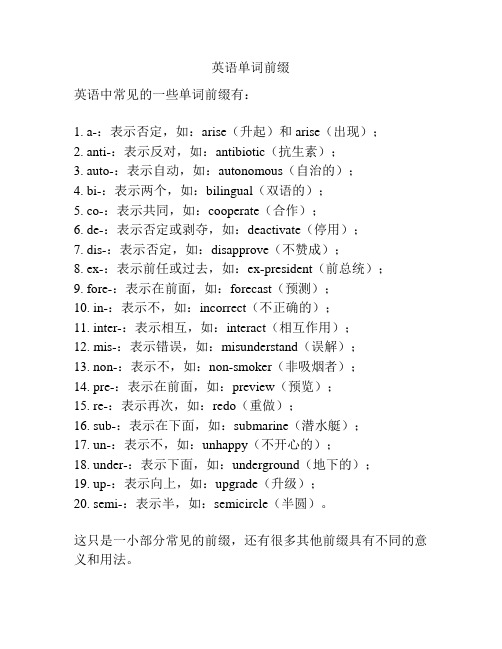
英语单词前缀
英语中常见的一些单词前缀有:
1. a-:表示否定,如:arise(升起)和arise(出现);
2. anti-:表示反对,如:antibiotic(抗生素);
3. auto-:表示自动,如:autonomous(自治的);
4. bi-:表示两个,如:bilingual(双语的);
5. co-:表示共同,如:cooperate(合作);
6. de-:表示否定或剥夺,如:deactivate(停用);
7. dis-:表示否定,如:disapprove(不赞成);
8. ex-:表示前任或过去,如:ex-president(前总统);
9. fore-:表示在前面,如:forecast(预测);
10. in-:表示不,如:incorrect(不正确的);
11. inter-:表示相互,如:interact(相互作用);
12. mis-:表示错误,如:misunderstand(误解);
13. non-:表示不,如:non-smoker(非吸烟者);
14. pre-:表示在前面,如:preview(预览);
15. re-:表示再次,如:redo(重做);
16. sub-:表示在下面,如:submarine(潜水艇);
17. un-:表示不,如:unhappy(不开心的);
18. under-:表示下面,如:underground(地下的);
19. up-:表示向上,如:upgrade(升级);
20. semi-:表示半,如:semicircle(半圆)。
这只是一小部分常见的前缀,还有很多其他前缀具有不同的意义和用法。
EIM Book 1 Unit 11 Promise, promise 单元知识要点

Unit 11 Promise, promisePart 1 (p82-83)New Wordcelebrate [ˈselɪbreɪt] v. 庆祝promise [ˈprɒmɪs] v./ n. 许诺,允诺eve[iːv] n. 前夕intention [ɪnˈtenʃn] n. 意向,意图midnight [ˈmɪdnaɪt] n. 子夜,午夜sparkling [ˈspɑ:klɪŋ] adj. 闪烁的,闪闪发光的crystal [ˈkrɪstl] n. 结晶,晶体,水晶appear [əˈpɪə(r)] v. 出现roof [ruːf] n. 屋顶,顶部second [ˈsekənd] n. 秒;num. 第二ground [graʊnd] n. 地面billion [ˈbɪljən] n./num. 十亿break [breɪk] v. 打破,折断,弄坏resolution [ˌrezəˈlu:ʃn] n. 决心strike [straɪk] v. 攻击,罢工,敲响报时(struck-struck)effort[ˈefət] n. 努力familiar [fəˈmɪliə(r)] adj. 熟悉的business [ˈbɪznəs] n. 商业drop [drɒp] v. 落下,掉下chips [tʃɪps] n. (bre) 炸薯条gym [dʒɪm] n. 体育馆,健身房cheer [tʃɪə(r)] v. 欢呼,使高兴angrily [ˈæŋgrɪli] adv. 愤怒地To be understoodTimes Square 时代广场New York 纽约increase [ɪnˈkriːs , ˈɪŋkriːs] v. 增加,增长decrease [dɪˈkriːs , ˈdiːkriːs] v. 减少bomb [bɒm] n. 炸弹Word Form1.celebrate [ˈselɪbreɪt] v. 庆祝---celebration n. 庆祝,庆祝活动---celebrate [ˈselɪbreɪt] v. 庆祝---celebrated adj. 闻名的---celebrity [səˈlebrəti] n. 名人2.intention [ɪnˈtenʃn] n. 意向,意图---intend [ɪnˈtend] v. 计划,意欲3.appear [əˈpɪə(r)] v. 出现---appearance [əˈpɪərəns] n. 外貌,出现---disappear [ˌdɪsəˈpɪə(r)] v. 消失4.cheer [tʃɪə(r)] v. 欢呼,使高兴---cheerful [ˈtʃɪəfl] adj. 令人愉快的,欢乐的,高兴的5.angrily [ˈæŋgrɪli] adv. 愤怒地---angry [ˈæŋɡri] adj. 愤怒的,生气的Phrases and Sentences1.New Year’s Eve 除夕2.promise v./ n. 许诺,允诺3.The government has promised a full investigation(调查) into the disaster.make/keep/break a promise 做出/遵守/违背承诺4.make/keep/break resolutions 制定/遵守/打破新年计划5.before/at midnight 午夜前/在午夜的时候6.on the roof of 在...的顶部7.world, come together to say ‘good bye’ to the old year and ‘hello’ to the new.8.not…any more= no more 不再9.In the US, New Year is also a time for thinking about(考虑) the changes you are going to make in your life.10.The ball takes sixty seconds to drop to the ground. Then the clock strikes twelve and everyone cheers.11.have ... in common 在某方面有共同点[have something /a little /a lot in common]The two cultures have a lot in common.Many New Year’s resolutions have one thing in common: people break them before the New Year is very old.12.for one thing 首先,一方面13.take up 开始从事,占用,接受14.make an effort to do sth. 努力做某事We all make an effort to finish the project on time.15.check out that new gym 看看那个新开的健身房什么样16.be familiar to sb. 为....所熟悉The smell is very familiar to everyone who lives near a bakery.17.be familiar with sth. 熟悉,知晓,精通某事Are you familiar with the computer software they use?18.I really mean it. 我是认真的19.You can tell me off(训斥) if I don’t keep them this time.20.drop to 下降到…; drop by 下降了21.work out 解决22.give up doing sth. 放弃做某事23.look up 查找24.intend (not) to do sth. 打算(不)做某事=have an/ no intention to do sth. 打算(不)做某事25.get across= cross 横过26.modern art 现代艺术27.grow up 长大(无被动)28.bring up 抚养,养育(有被动)29.set up a business = start a business创业30.Grammar:进行时表计划、打算和预测。
EIM Book 1 Unit 11 Promise, promise 单元知识要点

Unit 11 Promise, promisePart 1 (p82-83)New Wordcelebrate [ˈselɪbreɪt] v. 庆祝promise [ˈprɒmɪs] v./ n. 许诺,允诺eve[iːv] n. 前夕intention [ɪnˈtenʃn] n. 意向,意图midnight [ˈmɪdnaɪt] n. 子夜,午夜sparkling [ˈspɑ:klɪŋ] adj. 闪烁的,闪闪发光的crystal [ˈkrɪstl] n. 结晶,晶体,水晶appear [əˈpɪə(r)] v. 出现roof [ruːf] n. 屋顶,顶部second [ˈsekənd] n. 秒;num. 第二ground [graʊnd] n. 地面billion [ˈbɪljən] n./num. 十亿break [breɪk] v. 打破,折断,弄坏resolution [ˌrezəˈlu:ʃn] n. 决心strike [straɪk] v. 攻击,罢工,敲响报时(struck-struck)effort[ˈefət] n. 努力familiar [fəˈmɪliə(r)] adj. 熟悉的business [ˈbɪznəs] n. 商业drop [drɒp] v. 落下,掉下chips [tʃɪps] n. (bre) 炸薯条gym [dʒɪm] n. 体育馆,健身房cheer [tʃɪə(r)] v. 欢呼,使高兴angrily [ˈæŋgrɪli] adv. 愤怒地To be understoodTimes Square 时代广场New York 纽约increase [ɪnˈkriːs , ˈɪŋkriːs] v. 增加,增长decrease [dɪˈkriːs , ˈdiːkriːs] v. 减少bomb [bɒm] n. 炸弹Word Form1.celebrate [ˈselɪbreɪt] v. 庆祝---celebration n. 庆祝,庆祝活动---celebrate [ˈselɪbreɪt] v. 庆祝---celebrated adj. 闻名的---celebrity [səˈlebrəti] n. 名人2.intention [ɪnˈtenʃn] n. 意向,意图---intend [ɪnˈtend] v. 计划,意欲3.appear [əˈpɪə(r)] v. 出现---appearance [əˈpɪərəns] n. 外貌,出现---disappear [ˌdɪsəˈpɪə(r)] v. 消失4.cheer [tʃɪə(r)] v. 欢呼,使高兴---cheerful [ˈtʃɪəfl] adj. 令人愉快的,欢乐的,高兴的5.angrily [ˈæŋgrɪli] adv. 愤怒地---angry [ˈæŋɡri] adj. 愤怒的,生气的Phrases and Sentences1.New Year’s Eve 除夕2.promise v./ n. 许诺,允诺3.The government has promised a full investigation(调查) into the disaster.make/keep/break a promise 做出/遵守/违背承诺4.make/keep/break resolutions 制定/遵守/打破新年计划5.before/at midnight 午夜前/在午夜的时候6.on the roof of 在...的顶部7.world, come together to say ‘good bye’ to the old year and ‘hello’ to the new.8.not…any more= no more 不再9.In the US, New Year is also a time for thinking about(考虑) the changes you are going to make in your life.10.The ball takes sixty seconds to drop to the ground. Then the clock strikes twelve and everyone cheers.11.have ... in common 在某方面有共同点[have something /a little /a lot in common]The two cultures have a lot in common.Many New Year’s resolutions have one thing in common: people break them before the New Year is very old.12.for one thing 首先,一方面13.take up 开始从事,占用,接受14.make an effort to do sth. 努力做某事We all make an effort to finish the project on time.15.check out that new gym 看看那个新开的健身房什么样16.be familiar to sb. 为....所熟悉The smell is very familiar to everyone who lives near a bakery.17.be familiar with sth. 熟悉,知晓,精通某事Are you familiar with the computer software they use?18.I really mean it. 我是认真的19.You can tell me off(训斥) if I don’t keep them this time.20.drop to 下降到…; drop by 下降了21.work out 解决22.give up doing sth. 放弃做某事23.look up 查找24.intend (not) to do sth. 打算(不)做某事=have an/ no intention to do sth. 打算(不)做某事25.get across= cross 横过26.modern art 现代艺术27.grow up 长大(无被动)28.bring up 抚养,养育(有被动)29.set up a business = start a business创业30.Grammar:进行时表计划、打算和预测。
英语重音小技巧
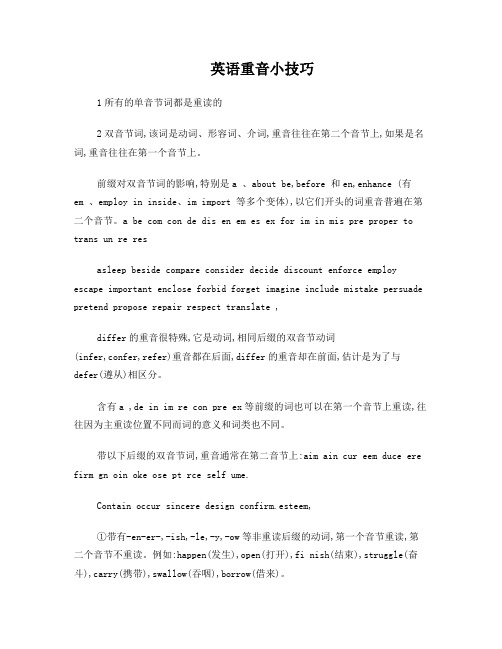
英语重音小技巧1所有的单音节词都是重读的2双音节词,该词是动词、形容词、介词,重音往往在第二个音节上,如果是名词,重音往往在第一个音节上。
前缀对双音节词的影响,特别是a 、about be,before 和en,enhance (有em 、employ in inside、im import 等多个变体),以它们开头的词重音普遍在第二个音节。
a be com con de dis en em es ex for im in mis pre proper to trans un re resasleep beside compare consider decide discount enforce employ escape important enclose forbid forget imagine include mistake persuade pretend propose repair respect translate ,differ的重音很特殊,它是动词,相同后缀的双音节动词(infer,confer,refer)重音都在后面,differ的重音却在前面,估计是为了与defer(遵从)相区分。
含有a ,de in im re con pre ex等前缀的词也可以在第一个音节上重读,往往因为主重读位置不同而词的意义和词类也不同。
带以下后缀的双音节词,重音通常在第二音节上:aim ain cur eem duce ere firm gn oin oke ose pt rce self ume.Contain occur sincere design confirm.esteem,①带有-en-er-,-ish,-le,-y,-ow等非重读后缀的动词,第一个音节重读,第二个音节不重读。
例如:happen(发生),open(打开),fi nish(结束),struggle(奋斗),carry(携带),swallow(吞咽),borrow(借来)。
新进阶3综合Unit4
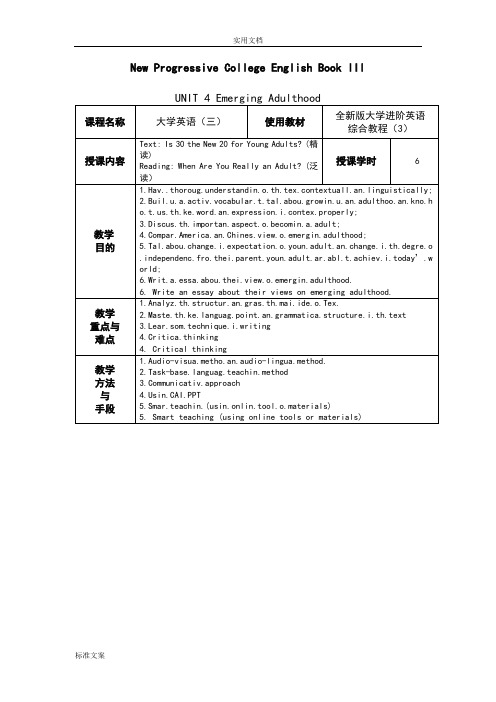
New Progressive College English Book III1.Teachin.Objectives:Students will be able toA.hav..thoroug.understandin.o.th.tex.contextuall.an.linguistically;.th.ke.word.an.expression.i.contex.properly;C.discus.th.importan.aspect.o.becomin.a.adult;par.America.an.Chines.view.o.emergin.adulthood;E. talk about changes in expectations of young adults and changes in the degreeof independence from their parents young adults are able to achieve in today’s world;F.writ.a.essa.abou.thei.view.o.emergin.adulthood.2.Tim.Allotment:1st Period: Lead-in Activities (Warm-up activities; Discussion about adulthood) 2nd Period: Global Reading (Text: Approaching the theme; Analyzing the text organization)3rd Period: Detailed Reading (Understanding the text in a deeper level; Analyzingdifficult sentence structures)4th Period: Detailed Reading Continued (Learning new words; Summarizing good usage)5th Period: Comprehending Reading 1 (Skimming the text; Explaining the difficult sentences of the text; Doing sentence translation))6th Period: After Reading (Viewing and listening; Speaking; Assignment) 3.Teachin.Procedures:3.1 Lead-in ActivitiesSte.1.Warm-u.activitiesThe teacher leads students to figure out the five stages of life (infancy, childhood, adolescence, adulthood and old age) and tells them a new life stage “emerging adulthood” has been proposed by psychologists to describe the period of time between adolescence and adulthood..Method: PPT, communicative approach.Step 2: Discussion about adulthoodTh.teache.ha.student.wor.i.pair.an.discus.th.question.i.Opene.abou.thei.ow.crit eri.fo.reachin.adulthood.Th.teache.remind.student.t.refe.t.th.helpfu.word.an.ex pression.give.belo.th.pictures.Method: Using task-based language teaching method, communicative approach.3.2 Global ReadingSte.1.Approachin.th.themeThe teacher has students know the background information about the term “emerging adulthood” in Culture Notes.Emergin.Adulthood.Startin.i.1995.psychologis.Jeffre.Jense.Arnet.interviewe .30.youn.peopl.age.1.t.2.i.citie.aroun.th.natio.ove.fiv.years.askin.the.questi on.abou.wha.the.wante.ou.o.life.Workin.fro.thos.interview.an.examinin.broa.dem ographi.indicators.Arnet.propose..ne.perio.o.life-spa.developmen.h.call.“emergin.adulthood”.从1995年开始, 历时5年, 心理学家杰弗里·阿内特在美国许多城市访谈了300位18-29岁的年轻人, 就他们想从生活中得到什么进行提问。
- 1、下载文档前请自行甄别文档内容的完整性,平台不提供额外的编辑、内容补充、找答案等附加服务。
- 2、"仅部分预览"的文档,不可在线预览部分如存在完整性等问题,可反馈申请退款(可完整预览的文档不适用该条件!)。
- 3、如文档侵犯您的权益,请联系客服反馈,我们会尽快为您处理(人工客服工作时间:9:00-18:30)。
Unit 11 Salvation
Part I Pre-reading Questions
1.Are you a believer of any religion? Or are you a non-believer? Whatever you are, how much do you know about
religion? Can you explain the reasons why a seemingly growing number of people in China have taken on one religion or another?
2. Langston Hughes is a modern American black poet and writer. Do you know about him? If not, try to find some
information about him and give a speech about him in 3-5 minutes.
3. Read through the text, try to find the words or phases used in the Christian religion and explain their meanings.
Part II Structural Analysis
1. This story, which is told in___________ person, is mainly organized in ______________order, with a ___________in the second paragraph and plenty of vivid and interesting ___________in the whole text.
2. The writer is very effective in making this narration vivid, interesting and expressive. Analyze the skills used by the author; summarize the ways of successful descriptive writing.
Part III Translation & Paraphrase
1. 他是一个顽固的走私犯,即使他的行李袋里面藏了500只金表,,通过海关时也不会害怕。
2. 这个看上去饱经风霜的渔翁伸出他那由于辛劳而布满老茧的双手,开始讲述了他海上生活的艰难历程。
3. 不知是何原因,许多大学生又表现出对中国传统戏剧如京剧何越剧的浓厚兴趣。
4. 这两个邻国结束了长达十年的战争,签署了和约。
自那时起,两国的经济交往和双边贸易得到迅猛发展。
5. 当诺贝尔奖得主由主席陪同上讲台时,整个大厅顿时爆发车一阵欢呼声和鼓掌声。
6. 舞会进行到高潮时,舞厅里一片乐曲和歌声。
1. Every night for weeks there had been much preaching, singing, praying, and shouting, and some very hardened sinners had been brought to Christ, and the membership of the church had grown by leaps and bounds.
2. The preacher preached a wonderful rhythmical sermon, all moans and shouts and lonely cries and dire pictures of hell, and then he sang a song about the ninety and safe in the fold, but one little lamb was left out in the cold.
3. When things quieted down, in a hushed silence, punctuated by a few ecstat ic “Amens”, all the new young lambs were blessed in the name of God.
4. I began to wonder what God thought about Westley, who certainly had not see Jesus either, but who was now sitting proudly on the platform, swinging his knickerbockered legs and grinning down on me, surrounded by deacons and old women on their knees praying.。
